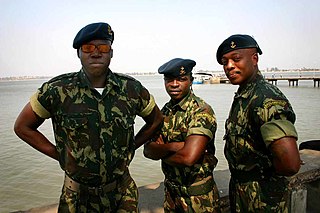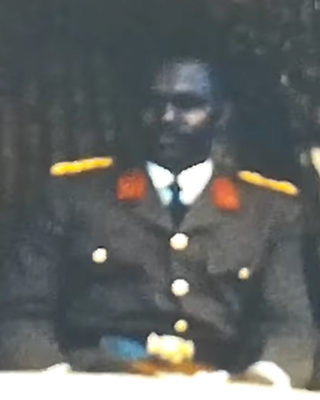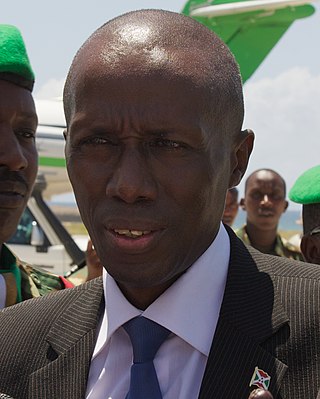The BurundiNational Defence Force is the state military organisation responsible for the defence of Burundi.

The Mozambique Defence Armed Forces or FADM are the national armed forces of Mozambique. They include the General Staff of the Armed Forces and three branches of service: Army, Air Force and Navy.

Burundi originated in the 16th century as a small kingdom in the African Great Lakes region. After European contact, it was united with the Kingdom of Rwanda, becoming the colony of Ruanda-Urundi - first colonised by Germany and then by Belgium. The colony gained independence in 1962, and split once again into Rwanda and Burundi. It is one of the few countries in Africa to be a direct territorial continuation of a pre-colonial era African state.

Michel Micombero was a Burundian military officer and politician who ruled the country as de facto military dictator for the decade between 1966 and 1976. He was the last Prime Minister of the Kingdom of Burundi from July to November 1966, and the first President of the country from November 1966 until his overthrow in 1976.

The president of Burundi, officially the President of the Republic, is the head of state and head of government of the Republic of Burundi. The president is also commander-in-chief of the National Defence Force. The office of the presidency was established when Michel Micombero declared Burundi a republic on 28 November 1966. The first constitution to specify the powers and duties of the president was the constitution of 1974 adopted in 1976. The constitution, written by Micombero, affirmed Micombero's position as the first president of Burundi. The powers of the president currently derive from the 2005 constitution implemented as a result of the 2000 Arusha Accords after the Burundian Civil War. The current president since 18 June 2020 is Évariste Ndayishimiye.

Sylvestre Ntibantunganya is a Burundian politician. He was President of the National Assembly of Burundi from 23 December 1993 to 30 September 1994, and President of Burundi from 6 April 1994 to 25 July 1996.

The position of vice-president of the Republic of Burundi was created in June 1998, when a transitional constitution went into effect. It replaced the post of Prime Minister.

The principle law enforcement agency in Burundi is the National Police of Burundi. The police falls within the jurisdiction of the Ministry of Public Security. It is separate from the National Intelligence Service (SNR), the state intelligence agency.

Burundi, officially the Republic of Burundi, is a landlocked country in the Great Rift Valley at the junction between the African Great Lakes region and Southeast Africa, with population of over 14 million people. It is bordered by Rwanda to the north, Tanzania to the east and southeast, and the Democratic Republic of the Congo to the west; Lake Tanganyika lies along its southwestern border. The capital city is Gitega and the largest city is Bujumbura.
Laurent Kavakure is a Burundian diplomat and politician who served the Minister of Foreign Affairs of Burundi from November 2011 to May 2015.

On 25 April 2015, the ruling political party in Burundi, the National Council for the Defense of Democracy – Forces for the Defense of Democracy (CNDD-FDD), announced that the incumbent President of Burundi, Pierre Nkurunziza, would run for a third term in the 2015 presidential election. The announcement sparked protests by those opposed to Nkurunziza seeking a third term in office.

On 13 May 2015, army general Godefroid Niyombare said that he was "dismissing President Pierre Nkurunziza" following the 2015 Burundian unrest. However, the presidency tweeted that the "situation is under control" and there is "no coup".
Cyrille Ndayirukiye was a Burundian politician and Army general. He served as Minister of National Defence of Burundi from 2000 to 2002. He was also one of the main anti-government militants in the 2015 coup attempt.

Pontien Gaciyubwenge is a Burundian politician and soldier. He served as Minister of National Defence in the government of President Pierre Nkurunziza from 30 August 2010 until he was fired on 18 May 2015, after a failed coup d'état took place.
Marie-Rose Nizigiyimana is a Burundian politician. She held the post of Minister of Trade, Industry, Post and Tourism in the government of President Pierre Nkurunziza from 18 February 2014 until she was fired on 18 May 2015.

On 28 November 1966, Michel Micombero, Burundi's 26-year-old Prime Minister, ousted the 19-year-old king (mwami) of Burundi, Ntare V, in a coup d'état. Ntare was out of the country at the time and the coup leaders quickly succeeded in taking control. Micombero declared an end to the monarchy and the Kingdom of Burundi became a republic, with Micombero as its first President.

Burundi–India relations are the international relations that exist between Burundi and India. Apart from bilateral relations, India also engages with Burundi through the African Union and the Regional Economic Communities (RECs).
The National Intelligence Service is the state intelligence agency of Burundi. The SNR is headed by an administrator-general who reports directly to the President of Burundi, while its individual agents report both to the SNR hierarchy and the public prosecutor. It runs its own detention facilities and is separate from the National Police of Burundi and the National Defence Force.

General Évariste Ndayishimiye is a Burundian politician who has served as the tenth President of Burundi since 18 June 2020. He became involved in the rebel National Council for the Defense of Democracy – Forces for the Defense of Democracy during the Burundian Civil War and rose up the ranks of its militia. At the end of the conflict, he entered the Burundian Army and held a number of political offices under the auspices of President Pierre Nkurunziza. Nkurunziza endorsed Ndayishimiye as his successor ahead of the 2020 elections which he won with a large majority.
















